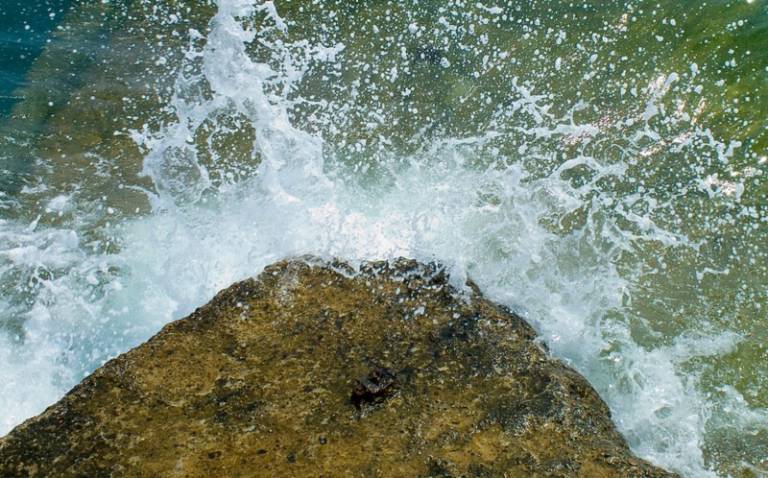Podcast: Is taking A-Level Geography worth it?
UCL Research Fellow Abbie Chapman answers the question 'Is taking A-Level Geography worth it?' She tells Ask The Expert podcast host Roberta Livingston about her experience.

22 February 2024
Image credit: UCL Imagestore
TRANSCRIPT
ROBERTA LIVINGSTON:
Hello and welcome to Ask The Expert, where you ask the questions and UCL’s finest experts answer them. I’m your host Roberta Livingston, a schools engagement assistant at UCL East. In this episode we hear from Abbie Chapman. A research fellow at UCL who did a PhD in Deep Sea Ecology. Abbie is going to be answering the question ‘Is taking A-Level Geography worth it?’ Let’s hear what Abbie has to say.
ABBIE CHAPMAN:
I’m Abbie Chapman, I’m a research fellow at University College London and all that means is that I did a Phd so a longer period of study that was quite specialised, I did that in deep sea ecology actually so I studied life on the sea floor in the bottom of the oceans, where there’s no light. But when I joined UCL, I started researching life on land. And so what I look at now is I spend time mostly on the computer mapping and modelling. So I’m using coding languages, but also other computer programmes. And to look at effectively what the impacts of our food systems are on biodiversity, so the wildlife around us. Particularly in South Africa, India and the UK, but also other countries, I'm compiling to now as well.
So yeah. You're asking is a level geography worth it? Well, my biassed first answer would be yes, definitely, but I'm aware that the answer to this actually really varies depending on who you are and what you want to do and what you love. So the first question I'll be asking you to ask yourself is what do you actually love and enjoy? The reason I say that is because at the end of the day, it sounds really obvious, but you're going to be sitting in the classroom sitting, listening to lessons, reading things, doing the homework, doing your exams, and it's going to be on a certain subject. And it'll be really much, much easier for you to commit yourself to that, to motivate yourself for that, if you actually enjoy it. So I would really think about that before choosing your A levels because there's a lot of advice that goes around about what's the best a level and what's what's not such a good a level. And I have to be honest, in my experience, since all those conversations happened to me too. It's actually not been so important. In the end. I think a lot of the advice I got at school sometimes was a bit biassed towards what would look good at a university, but I'm not entirely sure that's always the best advice. I would, I think mostly about what you enjoy and what you might want to do in the future.
One thing I would flag is if you have a really specific career in mind now some people do. I didn't, but some people do. I would just maybe investigate if you want. If you have courses that you would need to do at a university or a college after your A levels, that would maybe you to start that career. They want specific subjects. Make sure you're doing those. So for instance, if you wanted to be a medical doctor or a vet or a dentist, and there are other careers too, where there's to be important to consider, just make sure you've got a levels that align for that, because maybe geography won't fit by the time you've got the sciences, they might be asking for, for instance, if you don't have a specific career in mind, geography can be really, really even even better than other subjects for a specific reason, really. And that it's sort of more than one subject captured in in geography.
So under geography you have a really rare opportunity to study a real breadth of areas or fields as they sometimes call it university. So universities split things into social sciences and life sciences, but what they're actually talking about there is things that you cover in geography. So in your social sciences, you'll be considering things like how people are living, how cities are built, which communities are more vulnerable in the world, how developing, how developing nations are developing and how they're moving forward in things like agriculture and things like urbanisation.
You'll also look at economics. You'll consider things like development are considered under that, but you'll also look at the impacts of different industries on different groups of people and then under life and physical and even chemical sciences, you do things like bits of geology. They won't be called this. They'll be called geography at school, but they'll be split when you go to university. So you do things like geology and study rock formations. You might study a bit of oceanography, actually, you'll learn about coastal erosion, but if you went to university to study oceanography, you'd learn about that process too.
So your rocks, your volcanoes, your coasts, your rivers, your flooding, that's often what people think of with geography. That's physical geography. There's also the human geography side that you tend to cover in A level geography as well. So you're you're getting a real breadth of understanding. And I also want a flag. I was, I was on a workshop recently with the British Ecological Society. They were asking us to try and make sure how we can capture climate change and what we need to know about climate change in the school curriculum. And when we were doing this, we actually found that most of the climate change science, most of the most up to date research on climate change is taught under geography. A level isn't actually captured so much under biology like they thought it might be, and so if you're interested in climate change and how the world's responding to it, how ecological communities say the wildlife's responding to it, you might find you get to do a bit of that under geography as well.
So I'd always say I'd also say if you find you started an A level like geography and you weren't so sure it was for you longer term, you didn't want to do geography at university or something like that. I mean, it opens up other doors. So I did it and then I actually did do geography at university because I did really enjoy it. But I did end up also doing oceanography because the university I was at was offering that as something I could do alongside. So I got to study the oceans as well as the land and which I particularly enjoyed. And a lot of the people I worked with left to completely different careers as well. It's a really good one for getting into teaching. I find a lot of a lot of my friends and stuff doing that, but others work. For big companies, so some of them work using the mapping skills they developed in geography at university. So basically decide where for instance, you could decide where the next big supermarket is going to be, or where this town needs to be, and considering how it's going to impact nature, how it's going to impact people, and where then next based place to use some land is.
It's becoming a really important subject and really important skill sets that you learn through it for the future of land use in the UK, for instance, or across the world. So I'd say if you if you're thinking thanks to geography about how the world works across space in different subjects in different fields, you're getting what are called interdisciplinary skills and you might not have come across this word yet, but I promise you it's a word you'll see a lot in the future. They want people these days in many jobs.That don't just think about one really narrow subject. You can be really passionate about, really one narrow subject, but it's really helpful if you can talk to people who are passionate about other ones too.
And that might sound really simple, but it can actually be really quite a difficult thing to do if you're not used to having to learn terminology from other subjects, or having to think in different ways and geography prepares you really quite well for that. And also, if you're into things like I was describing, you'll learn something called geographic information systems. That's something you learn at university level, probably not so much during an A level unless you want to explore it all. That means is you're doing some nice mapping really. So you're mapping out different things and seeing what overlaps with what, what's causing problems for what. Where can things go? Where can rivers flow? Where might flooding happen? There's lots of opportunities that are made possible by maps.
And I'd also say that I think part of the was I was looking at the curriculum now because I'm aware that I went a while ago and I didn't want to be misgiving, misleading information. And I noticed there still seems to be an aspect of field work which is great to see. Yes, you might get muddy or you might choose a city based project and not get to say muddy. But field work is brilliant for your CV regardless of what you want to do next because it if you didn't know this already and you're thinking of how to write a CV for the future, it's an example of teamwork.
For example, you can organise yourself and to be honest it gives the really impression that you probably have a really good attitude and say putting field work on your CV. As always, I believe going to be a really good thing that employers in all sorts of industries. And academia and other types of jobs are going to really appreciate. So I'd also say bear that in mind. So yeah, putting your wellies on or donning your clipboard to go on and interview some people is always going to be well worth doing. So do enjoy that part of your project if you do decide to take the geography a level as well.
ROBERTA LIVINGSTON:
And so there you have it! For Abbie taking A-Level Geography was worth it as it opened up many doors for her including the opportunity to study Oceanography. A-Level Geography is almost like a gateway to specific subjects that are available at UCL and other universities so if for instance you wanted to study Geology, taking A-Level Geography would be a requirement.
And that is the end of this episode, I hope it was helpful! If you wish to submit your own question for an expert to answer just type in Ask The Expert UCL on your search engine and our website should be the first to pop up.
Til next time! Thank you.
 Close
Close


